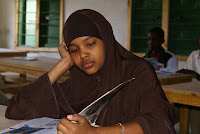
We begin the day by visiting the only public library in Puntland. The library has many books from the US based Books for Africa, most of which are relevant, and it is located in an impressive building which serves as a resource for civil society. There are workshops running all over the building it seems. Back at our workshop, we agree the library could be improved by better labelling of the shelves and better organisation by subject. We discuss girls and libraries, as in Hargeisa. One group mentions that there are 'cultural problems' for females to work with males. After discussion we agree that females and males tend to sit separately. Whether this is considered a cultural problem or not, certainly in the libraries, girls sit separately from the boys, and often at the back of the library. One group suggest libraries for boys and libraries for girls. At the end, the participants provide positive feedback on the workshop and seem to leave happy - one says the most useful thing he learnt was that 'reading is food for the mind and imagination'. Tomorrow, I begin the long journey home to London via Nairobi, with perhaps a last library visit to the teachers' college here if there is time before the flight.









 This is my first visit to Somaliland which, though officially a part of Somalia in the eyes of the world, sees itself as very much an independent state. It has been operating that way fairly successfuly and peacefully for over 15 years, but it is a fledgling state. Libraries are seen as one way to help rebuild and support the country.
This is my first visit to Somaliland which, though officially a part of Somalia in the eyes of the world, sees itself as very much an independent state. It has been operating that way fairly successfuly and peacefully for over 15 years, but it is a fledgling state. Libraries are seen as one way to help rebuild and support the country.